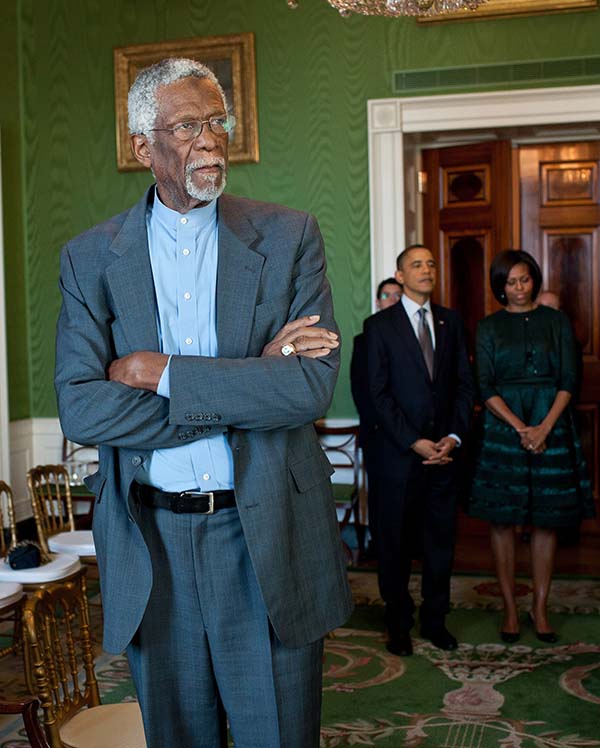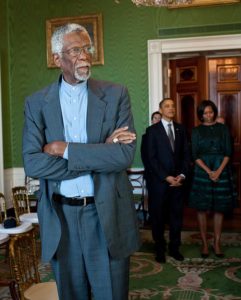Bill Russell
Born in Monroe, Bill Russell was the first African American coach in the NBA and a vocal member of the civil rights movement.

Public Domain.
Bill Russell waits in the Green Room of the White House before receiving the 2010 Presidential Medal of Freedom.
Monroe native Bill Russell was more than a talented basketball player. The six-foot, ten-inch center led a Boston Celtics team that won eleven National Basketball Association (NBA) championships during his thirteen-year career, and his dominating style of play under the basket—on offense and defense—changed the way the game was played. For a generation, Russell was regarded by many as the greatest basketball player in the sport’s history.
The relationship between the basketball Hall of Famer and his home state of Louisiana has been a complex one, however, fraught with bitter memories of the racism he and his family suffered during his childhood years in Monroe. The influence of his parents’ love and support amid the challenges he encountered growing up in the Jim Crow South stayed with him throughout his career, and beyond.
Russell was born on February 12, 1934. His family moved to Oakland, California, when he was eight years old, and Russell attended nearby San Francisco University on a basketball scholarship. With Russell at center, the team won back-to-back National Collegiate Athletic Association (NCAA) championships in 1955 and 1956. Russell also was a star of the US basketball team that won the gold medal at the 1956 Olympics in Melbourne, Australia.
Drafted by the Boston Celtics, Russell used his deft agility and aggressive playing style as a rebounder, man-to-man defender, and shot blocker to become what many hoops observers believe was the greatest defensive player in professional basketball history. He also was a talented inside shooter, scoring 14,522 points during his career. From his center position, Russell established a gargantuan, suffocating presence, serving as the unquestioned anchor of a Boston Celtics dynasty that won eleven league championships between 1957 and 1969. As the NBA’s online biography of Russell confirms, “Until the ascent of Michael Jordan in the 1980s, Russell was acclaimed by many as the greatest player in the history of the NBA.”
But Russell was also a trailblazer off the court. When the great Red Auerbach retired as the Celtics’ coach in 1966, Russell took the reigns, becoming the team’s player-coach and the first black coach in NBA history. He was also one of the few high-profile athletes to take an active and vocal part in the civil rights movement, displaying a dignity forged partially by the stinging memories of his childhood in Monroe. Because of this disposition Russell was often viewed as surly, aloof, and cantankerous with the media, executives, and even fans.
But in hindsight, many pundits have suggested that such characteristics—or at least the impressions of them—were triggered by Russell’s utmost belief in the concept of team. Both as a player and a coach, Russell stressed the sacrifice of individual glory for the good of a team. Where some saw intractable and prideful stubbornness, those close to Russell saw selflessness, loyalty, and utter dedication to winning and to those who shared a mutual trust.
Such traits were perhaps initially ingrained during his childhood in Monroe, where the crushing effects of racial prejudice were mitigated by the love displayed in his close-knit family. In 1999 Russell told Sports Illustrated’s Frank Deford, “I remember that my mother and father loved me, and we had a good time, but the white people were mean. But I was safe. I was always safe. In all my life, every day, not for one second have I ever thought I could have had better parents.”
A member of the Naismith Memorial Basketball Hall of Fame and the National Collegiate Basketball Hall of Fame, Russell was further recognized by the NBA in 2009, when the league championship’s most valuable player award was named in his honor. In 2011 President Barack Obama awarded him the Presidential Medal of Freedom for his efforts in the field of civil rights.
Russell died on July 31, 2022, at the age of 88.
